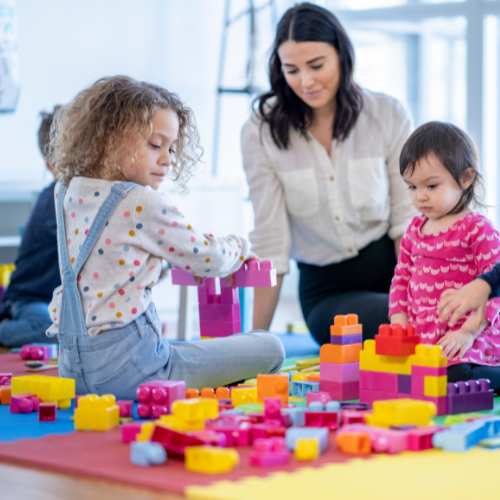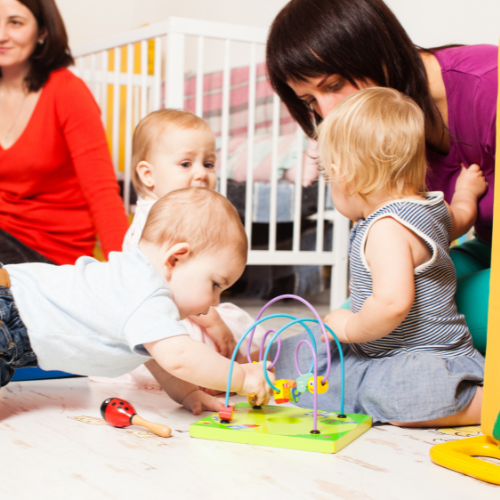The Importance of Communication and Wellbeing in the Early Years.
14th March 2023
Guest blog by Thriving Language.
Share this entry:
We wanted to start with a few questions and for us all to take a mindful moment:
- What should the foundation of early years be?
- What is the most important element of your life and your practice as an educator?

Can you remember being at playgroup, do you remember how it felt to be little and in a different space away from your family? Some people can recall clearly and others cannot, there is no right or wrong answer. It is about the feeling. Rebecca can remember the painting apron; it was oversized, thick and made of rigid material, she was able to tolerate this sensory experience and was therefore able to access the painting area which she loved.
Becky remembers being able to drink out of a cup without a lid, however she always had a lid on her cup at nursery, her older brother told the educator that Becky didn’t have a lid and she replied “she does now she’s here.” A throw away comment, not meant to cause any hurt or harm, but nevertheless disempowering for both young children.
Here at Thriving Language, we feel the key role of the educator is to understand the child, their communications, their patterns of play, their emotional and physical wellbeing. The most important aspect being the child’s story; who they are, what they already know, who is their world, what do their experiences bring and how can we value and listen to them.
The number of children with speech, language and communication needs is growing and so those of us in education are in a position to offer support and understanding through our everyday actions and practice. So how can we do this in a busy environment?
We must always start with looking and listening. We can show the children that we are interested in what they are communicating to us by positioning ourselves at the same level as them, chatting to them in a conversation style as you would with a friend. Keep your interactions relaxed and try not to lead. It is important to notice and understand what children are ‘telling’ us when they are not using words. Always look for eye pointing, body language and facial expressions and to make this clear, we are referring to ALL children educators work with, however they are communicating.
The Thriving Language Approach uses:
Time, Space, Pace to create optimal environments for quality interactions and for children to be heard.

Space – give space for the child to play in a way that is meaningful to them. Enable ownership of space; children to create and follow their own ideas and know that these are respected and built upon.
Pace – allow time for natural conversation. Pace your interaction – look for cues to be invited to join play. Add provocation and show interest without taking over.
When we use Time, Space, Pace we are showing children that they matter and that they are valued.
Can you think of a time when you have felt valued and understood? How did this make you feel?
We must always remember that children are humans the same as us, we are just bigger! They experience the same range of emotions and they need ‘tuned in’ adults who are responsive to their emotions rather than reactive. An example of this could be ‘you look sad’ and rather than leaping in to try and ‘fix’ the situation, take a moment to be with the child, empathise with their feeling and contain this for them.
In these moments, we are using our verbal and non-verbal communication skills to co-regulate with the child. Co-regulation does not mean that we can stop the child from feeling sad or upset but it is when the adult lends some of themselves to show the child that they are safe and that they matter.
Communication and emotional well-being sit side by side.
Educators have a duty of care to respond to all non-verbal and verbal communication. It is vital that we create environments where all children are understood no matter how they are communicating.
‘To be listened to is to be loved’ (Thriving Language).
Both Becky Poulter Jewson, Director of Early Years & Rebecca Skinner, Speech and Language Therapist from Thriving Language will be running a seminar at Childcare & Education Expo North on the 1st July 2023! There seminar will focus on ‘Speech, Language and Communication needs and the impact on Emotional Wellbeing’. Don’t miss out and register for your free ticket here.
Why attend Childcare & Education Expo?
Join over 2,500 like-minded individuals from the early years & primary sector who are dedicated to improving their practice and their education settings.
Attend educational seminars and panel discussions to credit your CPD
Meet the experts to have your questions answered
Receive fantastic onsite offers and discounts
Experience expert-led informative hands-on workshops
Network with peers and industry players
Pick up hundreds of new products, resources, ideas and services
And most of all, enjoy a great day out with your colleagues




